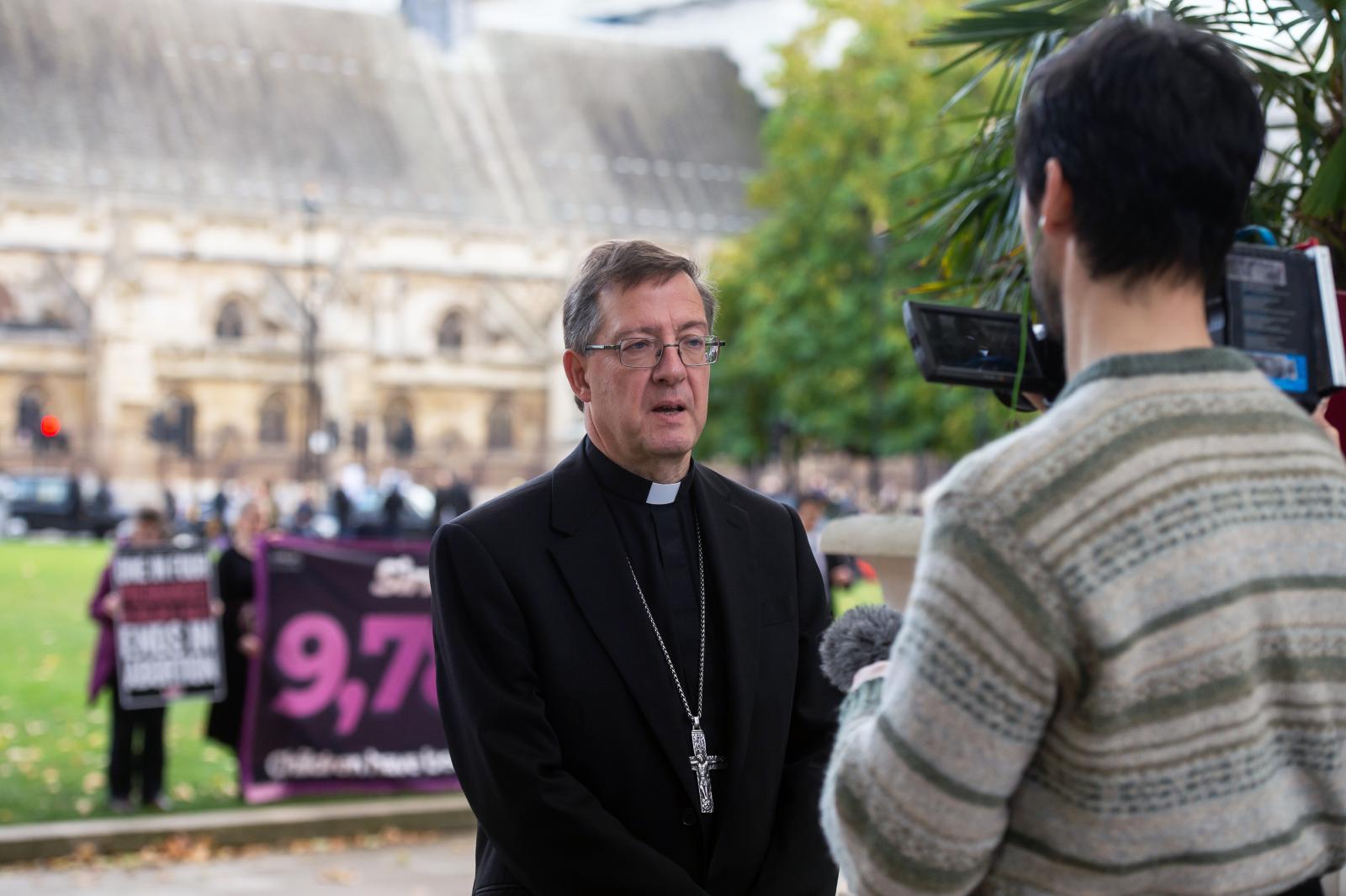Address given at the act of witness on the 54th anniversary of the Abortion Act, 27th October 2021, outside Parliament
Today is the 54th anniversary of the passing of the Abortion Act in 1967. We grieve for the death of so many children, unborn lives, by legal abortion, almost 10 million since that date. We remember those women who carry the pain and burden of their decisions. As the numbers continue to rise each year, the conversion of hearts and minds towards the unborn child is ever more urgent.
This week as we approach the COP26 meeting, focus has turned to the care of God’s gift of creation and good stewardship of the earth. Many hours will be spent pondering emissions and policies. Behind this debate, Pope Francis reminds us in his encyclical Laudato Si’ that everything is ‘interconnected’ and connected to every other part of creation. As we listen to the cry of the earth and the cry of the poor, we also listen to the cry of the unborn child in the womb, a voice that cannot be heard, but part of the interconnectedness of all reality. The Pope writes, ‘Since everything is interrelated, concern for the protection of nature is also incompatible with the justification of abortion. How can we genuinely teach the importance of concern for other vulnerable beings, however troublesome or inconvenient they may be, if we fail to protect a human embryo, even when its presence is uncomfortable and creates difficulties? “If personal and social sensitivity towards the acceptance of the new life is lost, then other forms of acceptance that are valuable for society also wither away”.' (Laudato Si’ 120, Caritas in Veritate 51)
This understanding invites our reflection on the set of relationships between persons and with the whole of creation. It includes our relationships between women and men, with the unborn child, and the elderly. It includes the gift of sexual dignity, marriage, family, the world of work and all social and economic relationships. Rights are not just about our freedoms but respect the nature of who we are as persons. From this flows our duties towards the vulnerable and those who cannot defend themselves.
The profound loss of understanding of the gift of unborn life and its connectedness to all of reality, is at the heart of many of our social challenges. Yet it is not totally lost, for this reason women agonise about abortion but often many cannot see alternatives. Facing moral anguish and desperation a choice is made which often leads to painful scars and deep grief which needs healing as evidenced by the wonderful work of Rachel’s Vineyard (https://www.rachelsvineyard.org.uk)
We have not only to face the terrible reality of almost 10 million legal abortions in this country but also address the conditions which lead to abortion. The interconnectedness of all reality makes us reflect on violence which destroys human relationships, especially sexual and domestic violence. The abduction and murder of Sarah Everard has shocked the country. This interconnectedness also makes us reflect on poverty and housing. There is a task of education to build mutual and loving respectful relationships. A study of the many factors which lead to abortion is needed to begin to address the reasons for this number.
There are glimmers of hope. Polls show that 60% of the general population and 70% of women believe that the current 24-week gestational limit for abortion should be reduced. (https://righttolife.org.uk/polling)
There is increasing concern about the law permitting abortion of children with disability up to birth. This has been highlighted recently in the courageous case taken by Heidi Crowter. Her cry sought legal recognition for the unborn with disability, ‘The judges might not think [the law] discriminates against me, the government might not think it discriminates against me, but I am telling you I feel discriminated against.’ She lost her case but not her innate dignity as a human being created by God from conception. She seeks appeal to the Court of Appeal. The argument must continue. (https://dontscreenusout.org/press-release-court-of-appeal)
Part of our contemporary task in educating and motivating others to love life is to open them up to the wonder of the mystery of life, not only in imagination but also in practice. We can witness to this truth and educate by example when we show acts of kindness in caring for those women who are pregnant in difficult circumstances and to support them in caring for their child. We can witness to forgiveness and God’s mercy when the Church offers the gift of mercy to those women who have chosen abortion.
Today’s Act of Witness resonates with the Pope’s hope that 'amid the present crisis [of the pandemic] all will be led to a greater appreciation of the moral imperative to build a ‘culture of life’ marked by ever greater concern for nurturing, protecting and promoting the integral welfare of all God’s children, beginning with the most vulnerable.' (Pope Francis, Message for the Day for Life, 2020)
Bishop John Sherrington
Photo: Mazur/CBCEW.org.uk
